Today is World Book Day! It’s a day where we celebrate books and encourage everyone to read. For the UK and Ireland this is not the case, they are the only ones to celebrate it on a different day. For this occasion, we are treating you with an amazing interview with the lovely Adrienne Dillard. Her book ‘The Raven’s Widow’ will be coming out soon as an audio book!
The Raven’s Widow is a novel about Anne Boleyn’s sister-in-law, Jane Boleyn. Written by Adrienne Dillard, who works in the financial services by day, but spends all her free time on writing and researching the women of Henry VIII’s court. We talked to Adrienne about her book, Tudor fascination and why she believes Jane suffered from a mental illness.
Adrienne Dillard Cover of The Raven's Widow
When and how did your interest in the Tudors start?
“I always have been interested in history for most of my life and I go through different phases. I have been interested in the American Revolution and Titanic, but my interest in the Tudors started when the movie ‘The Other Boleyn Girl’ came out, so that was 2008. Of course as I watched it, I didn’t know a lot about the time period, but it didn’t sit right with me. There are a lot of things in that movie which are very inaccurate, so I had to research it for myself and that’s how I got interested and just fell in love with the time period and I haven’t left it yet.”
Can you give a short summary of your book The Raven’s Widow?
“The Raven’s Widow focusses on Jane Boleyn who was the wife of George Boleyn (the brother of Anne Boleyn). There are a lot of myths that have sort of grown up over the centuries, so my book offers a different perspective of her and her time serving Anne, as both a family member and as a member of her household. It follows her life as she becomes a member of this rising family and then it sort of interspersed with her time in the tower as she is waiting for execution for her involvement in Catherine Howards’ fall. So it goes back and forth as she is in the tower, where she is remembering and reminiscing about her life and her marriage to George and how that affected her.”
Why did you turn your book into an audio book?
“Personally I love to read, but don’t always have the time to sit down with a book, because that takes a lot more focus and you can’t multitask while you’re reading. You also can’t read while you’re driving, but I listen to audiobooks while I am working during the day all the time and even while I am working around the house, while driving and while having a meal.
I think that it just makes your books more available to people who maybe aren’t as excited about sitting down and reading the book, or just don’t have the time to do it, so I think that audiobooks are great, because it gets them into it and also brings the story alive. I think that the woman I have narrating my book has done a fabulous job. She was actually who I pictured while I was writing the book, so when I listened to her read it, I felt my vision of Jane coming alive and I think that is just a really cool experience.”
What was the process like of making an audio book?
“Well, the narrator is a friend from school, so I have known her for many, many years. She is actually an actress in LA and she knew about my book from the beginning and said ‘hey, if you ever want to do it as an audio book, I would love to narrate it’ and she has done such a great job.
We had to sit down and go through the pages and I had to make notes on how to pronounce certain words, because even having studied the Tudors for a decade, some things I still don’t know how to pronounce. There was a lot of back and forth with my publisher on some of those things, because we’re American and there is a lot of difference between American and British. There were all those little quirks that we weren’t necessarily aware of.
We first tried to do it in a studio, but the quality of it didn’t turn out to be as well. So we just set it all up in my house, we put up a microphone and sound dampening. I had my son’s mattress up against the window and we kind of made our own little studio. It was just hours of sitting there and recording as she read the chapters. Afterwards, I used a program to edit it, so cutting out pieces where we messed up and from there it went to the publisher and they’ve worked their magic on it, so cool.
It was a lot of work, but it was also really fun, because in a way, it really allowed me to re-establish that friendship with Breeanna, my narrator. We didn’t talk a lot, because, of course, as you grow older, your lives kind of diverge and you get busy and so spending those hours together really re-ignited that friendship. It was really fun to spend that time with her. It was work, but it was also really joyful and fun to hear my book being read by somebody else, it added a new dimension.”
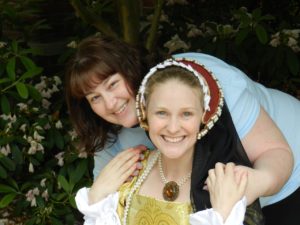
Adrienne and Breeanna
Are you planning on turning more of your books into audio books?
“I would love to! We’ll see how well this one goes, if people enjoy it and are interested. If so, I would definitely do one for my other book as well.”
What attracted you to Jane Boleyn and her story? And what was the research process like?
“So, I always find it very interesting when women are painted a certain way, like she has always been kind of portrayed as very evil and terrible and we all know that not everybody is bad. It’s not black or white. Everybody has their bulbs and they have their good things, so it kind of stuck out to me that the idea of Jane being so terrible just didn’t make sense. I think few people are that bad. Also, I had written about her in my first book and I sort of always felt like maybe I wasn’t as fair to her as I could’ve been.
Shortly after that first book’s publication I had surgery, a hysterectomy, and so I was really struggling with the idea that I wasn’t going to have any more children. It was kind of hard for me and I was recovering at about the same time of the anniversary of Jane’s execution. So I was reading all of these articles about her online and all these interviews and stuff and I just really sort of felt sympathetic to her, because she and George never had children. A lot of historians like to say that, they didn’t have children so they probably didn’t like each other and it was probably a horrible marriage, but we know people that are in happy marriages that don’t have children for one reason or another, whether it’s by choice or the choice is forced upon them due to physical circumstances. So I was in that situation where the choice was made for me and I really sympathized with her.
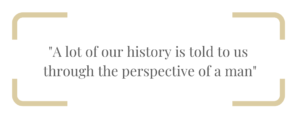 I thought maybe there is more to the story. George was the heir to the Boleyn family and so it would have been really important for George to have a son, to inherit from him. There were all these kinds of things that spoke to me, such as her experience losing her husband and how that would’ve affected her and her mental health.
I thought maybe there is more to the story. George was the heir to the Boleyn family and so it would have been really important for George to have a son, to inherit from him. There were all these kinds of things that spoke to me, such as her experience losing her husband and how that would’ve affected her and her mental health.
I was seeing all these similarities in Jane’s story and really connecting with that, because my stepfather died tragically and it really affected my mom. So I decided that I was going to research her more and that took going into the archives, reading Julia Fox’s brilliant biography on her and I went to the British library and held George Boleyn’s book that I talk about in my novel. It was really cool to be able to hold this 500 year old manuscript that George Boleyn had written in. Through that research this picture of Jane emerged that was a lot different than what we’ve been told about her, so I wanted to tell that story.”
Do you think she is often misunderstood?
“Yes, I absolutely do. I think a lot of it has to do with the perceptions of mental health and our perception of women. I think women in history are often very misunderstood, because a lot of our history is told to us through the perspective of a man. There are biases and hidden agendas. We just love to pit women against women and that is often the case with Jane and Anne. The history shows that actually they had a really good relationship, but of course that doesn’t make for a very good drama. So yes, I definitely think she is misunderstood and hopefully maybe I can change that a little bit over time.”
Claire mentioned that you think Jane Boleyn suffered from PTSD, why do you think that? Can you explain it a little bit more?
“I think her husband’s death would have been very traumatizing and it would have had a big effect on her. The main thing that stood out was when she was in the Tower of London before her execution. Jane had a mental breakdown and we don’t really get much information about what the mental breakdown was like exactly. Was she as pictured in ‘The Tudors’ where she is laughing hysterically on the floor. Was it that or was it just crying? I find her portrayal on ‘The Tudors’ to be very insulting. We don’t really know what exactly happened.
So when it happened they took her to the courtiers house to be rehabilitated so that way she could go to her death with a bit of dignity. I don’t necessarily think that it was to give her any dignity, I think that the king was afraid of what it would look like to execute an “insane” person. And, in fact, he had the law changed while she was being rehabilitated, because before, you could not execute someone who was mentally incompetent. I think for him it was a matter of let’s get her healthy so that he could march her up to the scaffold and not look terrible for it. So she did go to the scaffold and she did make a very dignified end as she was able to maintain her composure and made a good speech. We know this from a letter that was written describing her execution.
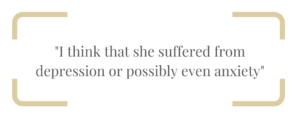 She was interrogated by the kings’ men during the fall of Catherine Howard. Her testimony is very disjointed, as she contradicts herself a lot. She mentioned that she even fell asleep, so she couldn’t give them an answer. Some of the things she did just really spoke to the symptoms of PTSD and it really clicked with me that maybe that was what was going on. But of course, they didn’t have a word for that back in the Tudor time, so she was just deemed insane. But I think that there was a lot more going on.”
She was interrogated by the kings’ men during the fall of Catherine Howard. Her testimony is very disjointed, as she contradicts herself a lot. She mentioned that she even fell asleep, so she couldn’t give them an answer. Some of the things she did just really spoke to the symptoms of PTSD and it really clicked with me that maybe that was what was going on. But of course, they didn’t have a word for that back in the Tudor time, so she was just deemed insane. But I think that there was a lot more going on.”
Do you have more examples of Tudor people suffering from mental health issues but were misunderstood in their days (for example the term anxiety attack did not exist back then, they were just called crazy)?
“Catherine Carey for example, who I wrote about in my first book, I think that she suffered from depression or possibly even anxiety. We know that, because of letters that her husband wrote back to court when she was ill. He mentioned that she wasn’t very good at looking after herself and that she was prone to fits of tears. And Robert Dudley, who was a friend of theirs and actually ended up becoming Catherine’s son in law, commented on her poor diet. She could’ve been a comfort eater or alternatively she didn’t eat. When you’re in a depressive state your diet is really affected.
There is also another time where Francis, her husband, asks secretary William Cecil to comfort his wife’s disease of the mind and he thanks him for comforting her in her sickly state. So, I think that for her, she definitely suffered depression. Jane Boleyn’s grandfather suffered from mental illness as well. Of course there wasn’t really an explanation for what exactly he had, but they just didn’t have words for it back then. So I think that a lot of times they were called insane, fools or many other words that we definitely do not use nowadays.”
Why should people read or listen to your book?
“Well, I think that people who are looking for a new perspective on Jane Boleyn and maybe even on Anne Boleyn and George as well as their relationship and how that affected Anne’s downfall. There has been a lot written about Anne, but not so much about the people that surrounded her. But the book is also fascinating for people who are interested in the effect that traumatic experiences have on people and how it changes their way of thinking. Because when trauma happens, it changes our brain chemistry, so it really does turn us into different people. I think that one of the things that is missing in Anne Boleyn’s stories is that we focus on what happened to her and how her death affected her, which is very important. But we don’t necessarily hear how her death affected the people surrounding her at court. So for people who are looking for that perspective, they will enjoy this book with the benefit from reading it or listening to it.”


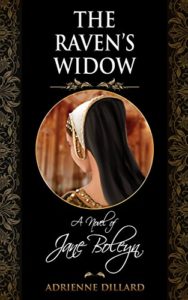
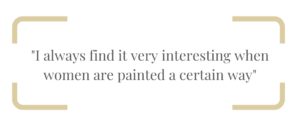
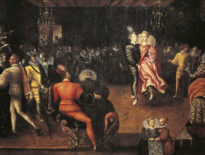
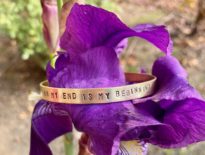
Very insightful interview, thanks!!